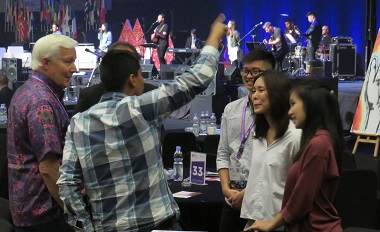
Delegates wanting to gain insights from three youth leaders from Heart of God Church in Singapore, where the average age is 22.
Several messages contended for top spot at the World Evangelical Alliance (WEA) General Assembly (November 7 – 12 in Jakarta, Indonesia), but the one that stood out for me was the urgent need to engage seriously with the people and problems of the world.
That is, to treat the theme of the gathering – Thy Kingdom Come – as a present imperative, not something to be expected at some point in the future.
The WEA launched ‘A New Decade of Holistic Disciple Making, 2020 – 2030,’ and the overall theme was reflected in most of the workshops, which were primarily related to holistic disciple making, developing inter-generational leadership and reaching out to young people much more intentionally, both in church and in the surrounding culture.
Thy Kingdom Come
The man asked to address the theme head-on during four plenary sessions was Indian Bible teacher / justice advocate C.B. Samuel. He got our attention the during his first talk when he stated that “the church of Jesus Christ and the evangelical community are a disgrace” in many parts of the world, more interested in entertainment than in being faithful.
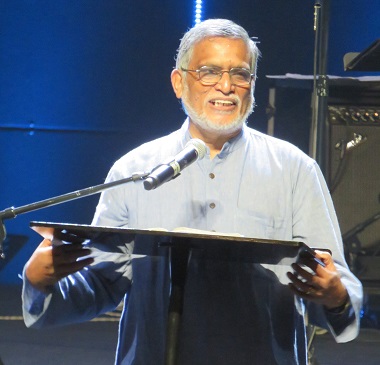
C.B. Samuel stressed the need to get outside of church walls and seek justice.
“I wish the kingdom would come by singing about it,” he said, “but it won’t.” He added that we need to rely on the word of God as we engage with issues in the world and model the kingdom.
During another talk he urged the gathered leaders to learn from Gandhi. He recalled visiting his home and having an old man point to a nearby hut. There, the man said, Gandhi would daily clean the wounds of the leper who lived inside. Samuel said that those who would be leaders in the church must first be servants.
Arguing that the corporate approach of many church leaders is “not good,” he added that the term ‘servant leadership’ has all but lost its meaning; that true leaders need to be in touch with human pain personally.
During a third talk, he said:
The God who is real is the God who is real when we go out in society. The kingdom goes into the kingdoms of the world and stands out by the freshness it brings. I am happy that we are gathering together, but the program begins when we go out from here.
Samuel’s themes were reflected in a number of ways throughout the week-long gathering.
Appropriate venue
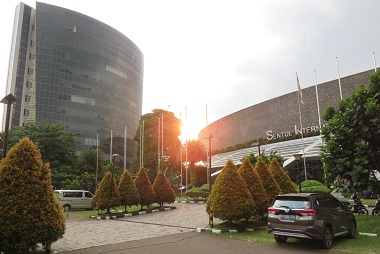
Sentul International Convention Center. The top floor of the tower is devoted to prayer.
More than 800 leaders from 92 nations met at the General Assembly in Jakarta. The World Evangelical Alliance, which represents over 600 million people, had not held such a gathering since 2008.
The meeting actually took place in the culturally rich city of Bogor, just south of Jakarta. The setting seemed appropriate to the underlying theme of engaging, or re-engaging with the world.
The Sentul International Convention Center, including a business tower (the top floor is set aside as a prayer space) and a nearby hotel, are owned by a Pentecostal denomination, Gereja Bethel Indonesia (GBI).
The 11,000 seat auditorium was full of Indonesian Christians the first night of the event. (I joked with my neighbour that the evangelicals were surrounded by Pentecostals, but that simply reflects the fact that most Pentecostals would be evangelical in their theology and that their wing of the church is growing fastest.)
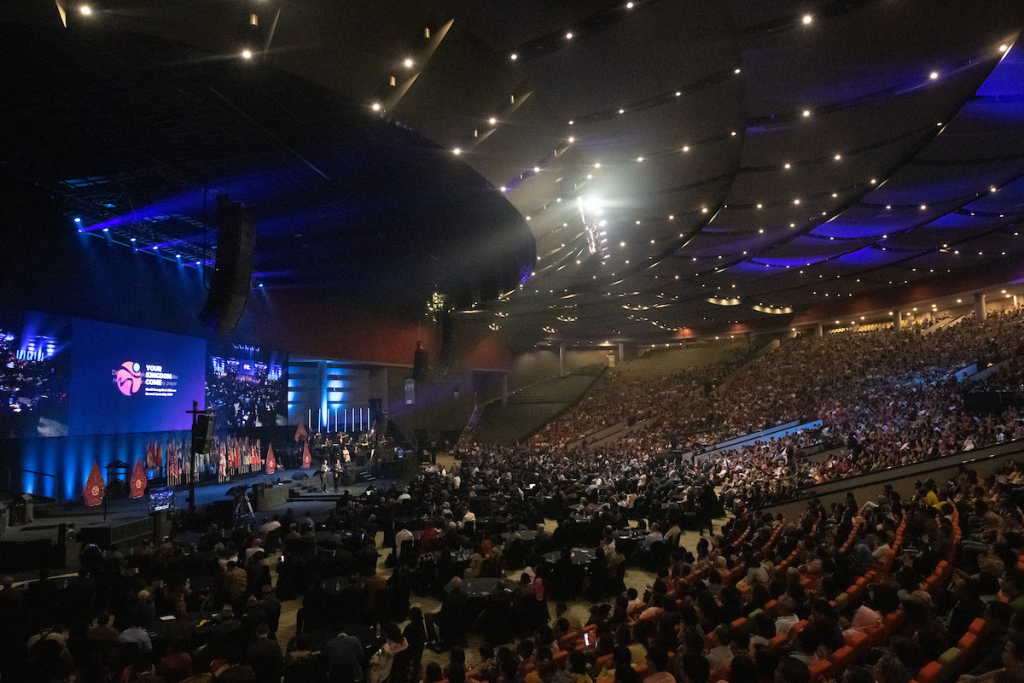
The 800 participants from 92 countries were joined by several thousand Indonesians for the opening ceremony of WEA’s General Assembly. Photo: WEA
The WEA noted in a release:
Speaking of the host country, [WEA Secretary General] Bishop Efraim Tendero commented: “We have carefully chosen Indonesia to be the hosts of our General Assembly because this is the country that has the largest Muslim population in the world, but there is also religious tolerance and harmony. And in Indonesia, the church of the Lord Jesus Christ is continuing to flourish and is having an impact in the society.”
Rev. Dr. Ronny Mandang, chair of the Fellowship of Indonesian Evangelical Churches and Institutions (FIECI) welcomed the delegates. His network covered the in-country costs, while the Sentul Center was offered for use at no charge.
The senior pastor of GBI, Pastor Dr Niko Njotorahardjo, also spoke on the first night:
The World Evangelical Alliance General Assembly in this place is not by accident; I firmly believe it is the specific purpose of God. Jesus gave us His Great Commission . . . My friends, don’t forget God wants all of us to be disciples of Jesus. Disciples are the people whose lifestyles resemble how Jesus lived.
A rather dramatic presentation on the final evening of the gathering confirmed the fact that Indonesian churches have been developing good relationships with leaders. The Indonesian Minister of Home Affairs (and former National Police Chief), Tito Karnavian, delivered an address which had not been scheduled.
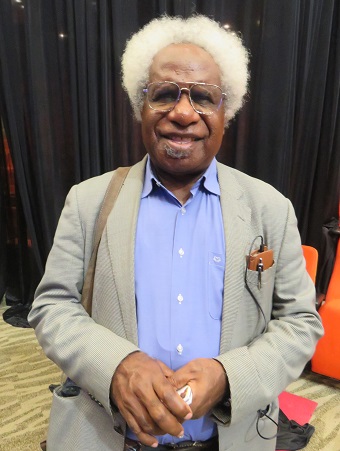
Lipinyus Biniluk (pictured) and Tito Karnavian know each other from Papua.
He was there because the President of Indonesia, Governors of all the states and many other political figures were going to be meeting at the Sentul Center the very next morning. (The convention centre is used for all kinds of large events – several people mentioned concerts by Justin Bieber, Celine Dion and Shawn Mendes, for example.)
Karnavian said, “This is my job,” to inspect the site beforehand. Once there, however, he apparently met an old friend from Papua who invited him to speak. The organizers introduced Lipiyus Biniluk – who works with the Indonesian Religious Harmony Forums – on the screen before Karnavian spoke, and I chatted briefly with him afterwards. He said they had known each other in Papua when Karnavian worked with the police there several years earlier.
Karnavian spoke at some length about the threat of terrorism in Indonesia – he arrested and interviewed most of those captured in Indonesia following several well-publicized attacks. He went into some detail about the background of al-Qaeda, ISIS and their significance around the world.
He said:
I like peace because I’m the former Chief of Police. . . . I am a Muslim, but I’m a moderate Muslim . . . we strongly believe that Islam is a religion of peace.
A Christian Today article included this about Karnavian:
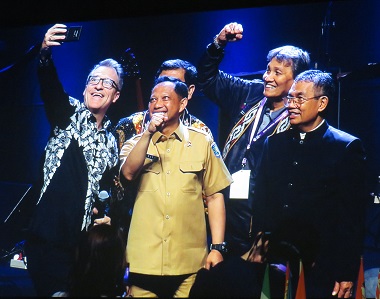
Several WEA leaders (including Ronny Mandang and Efraim Tendero) on stage with Indonesian Minister of Home Affairs Tito Karnavian.
During the closing ceremony . . . [he] said that the majority-Muslim country was “honoured and really proud” to host the World Evangelical Alliance’s General Assembly.
He said that Christianity could be a positive influence over radicalized Muslims tempted to join terrorism.
He also appealed to evangelicals to help in the fight against global terrorism by putting pressure on their political leaders back home to work towards peace, particularly in Syria and Iraq.
“You can contribute to create peace,” he said.
“We should push our leaders to help to create peace in the centre of gravity of the problem today, which is in Syria and Iraq.
“As long as there is this in Syria and Iraq . . . if war is there, then the rest of the problem will spill over [to other places] whether Indonesia, the United States [or] New Zealand.”
He continued: “This [problem] is because of ideology. Ideology cannot be defeated by the bullet. Ideology can only be defeated by another ideology.
“If other religions such as Christianity could give an example as a good model, as a good religion, a peaceful religion, I believe that those bad guys, they will be ashamed and hopefully they will regret if they are doing wrong.”
Karnavian received a very warm welcome from the delegates; he and Bishop Tendero exchanged gifts onstage.
National Alliances
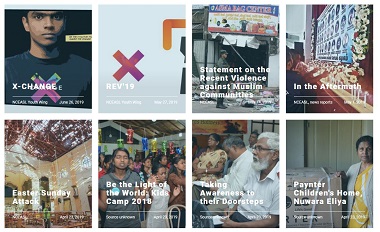
The National Christian Evangelical Alliance Sri Lanka is active on many fronts.
Even before attending the General Assembly, I was well aware of the good work undertaken by the Evangelical Fellowship of Canada, which carries on a wide range of activities under five headings from its offices in the suburbs of Toronto and in Ottawa: care for the vulnerable; church and mission; faith and community; religious freedom; and sanctity of life. I have re-posted their material and commented on their activities many times on this site.
But it was good to learn about some of the other 131 national evangelical alliances. Some are small, but others are very active.
For example, the National Christian Evangelical Alliance Sri Lanka has more than 80 staff, including six lawyers. The young woman who leads the legal team told me about their efforts to protect religious liberty, not just for Christians.
The peace-making nature of their work is clear from their statement following the Easter bombings which killed more than 300 people attending several churches earlier this year:
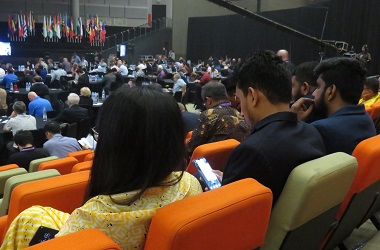
Part of the Sri Lanka team during a plenary session.
Even in the face of hate, the Church in Sri Lanka has refused to respond except in love. In a message posted on social media by ‘The Life’ – a Sri Lankan Christian ministry – Pastor Roshan Maheshen of Zion Church expressed love and forgiveness for the extremist group that carried out the attack on Zion Church and in other areas of Sri Lanka.
Displaying true Christ-like characteristics, the entire Christian community of Sri Lanka has refused to respond in violence to the attacks. The words of Christ “Father, forgive them, for they know not what they do” (Luke 23:24) rang true in the hearts of Christians as they posted messages on social media.
The National Christian Evangelical Alliance of Sri Lanka (NCEASL) joins the nation in mourning for the loss and pain our motherland has suffered. While denouncing the acts of hatred against Christians, the NCEASL calls for unity among the various nationalities so that we can heal as one nation and rise up from this bed of ashes.
The NCEASL is currently providing financial support for families who lost their loved ones and for those who have sustained injuries in the attacks. It also provides psychosocial assistance for those who are recovering from the immense impact this situation has upon their lives.
Shortly after that, the NCEASL issued another statement condemning mob violence against Muslims in the wake of the bombings.
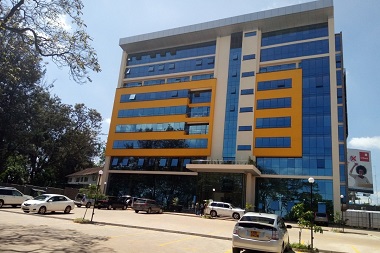
The headquarters for the Association of Evangelicals in Africa was completed this spring.
Africa is also home to many active national alliances, and many delegates attended the Jakarta gathering. A sign of the maturing WEA movement is the recent completion of a 10-storey African headquarters this spring. The Association of Evangelicals in Africa (AEA) celebrated the grand opening of the new AEA Plaza April 11 in Nairobi, Kenya.
An AEA report stated:
Over 300 invited guests drawn from global and regional Christian organizations, heads of churches and senior clergy in Kenya, ambassadors and senior representatives of the diplomatic corps, and building professionals and business leaders attended the grand opening. . . .
The key stakeholders for the AEA remain the National Evangelical Fellowships in 40 countries representing churches and individual evangelical Christians across the continent. . . .
[WEA Secretary General] Bishop Tendero also noted the confidence to pursue such a project was an act of faith: “The daunting task of putting up this great edifice is a manifestation of your faith, manifestation of your stewardship . . . Symbolically, evangelicals in Africa are standing tall around the world, because throughout the World Evangelical Alliance, AEA is the only regional alliance with a headquarters such as this and this is the manifestation of goodness and guidance of God.”
Commissions & Initiatives
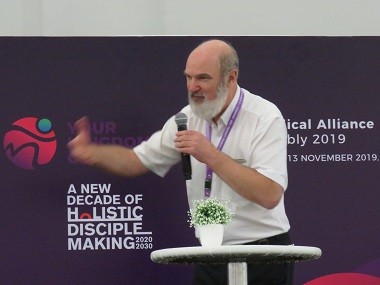
Thomas Schirrmacher said every new Christian should become involved with inter-religious dialogue.
Over the years, I have observed the work of Dr. Thomas Schirrmacher, from afar, with some admiration. He has several doctoral degrees, is director of the International Institute for Religious Freedom, has written and edited 102 books, etc (go here for his ‘short’ biography).
Wedding evangelical enthusiasm with considerable learning, he has tackled many issues where most fellow evangelicals might fear to tread.
Thus it was enjoyable to hear him in person during a workshop on ‘Holistic Disciple Making and Inter-religious and Interfaith Conversations.’ He urged confidence in our faith, saying:
Dialogue and witness and mission not only can go together, they should go together. . . .
Evangelicals are such a huge religious body that people will know about us anyway. Who best to tell them, us or the media?
As an example of working outside our comfort zone, he described meeting with the Grand Mufti of Pakistan – not a natural ally for evangelicals, but one who was able to, and did, prevent anti-Christian rioting.
Schirrmacher is just one of many people who are involved with a wide range of WEA Commissions and Initiatives. Here are some of them:
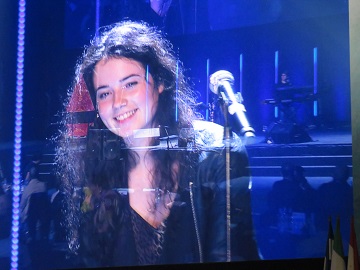
Worship played a large part in the General Assembly.
- WEA at the United Nations
- Global Human Trafficking Task Force
- Refugee Task Force
- International Institute for Religious Freedom
- Global Generosity Network
- Creation Care Task Force
- Sustainability Center
- Peace & Reconciliation Network
- Business Coalition
- Global Task Force on Nuclear Weapons
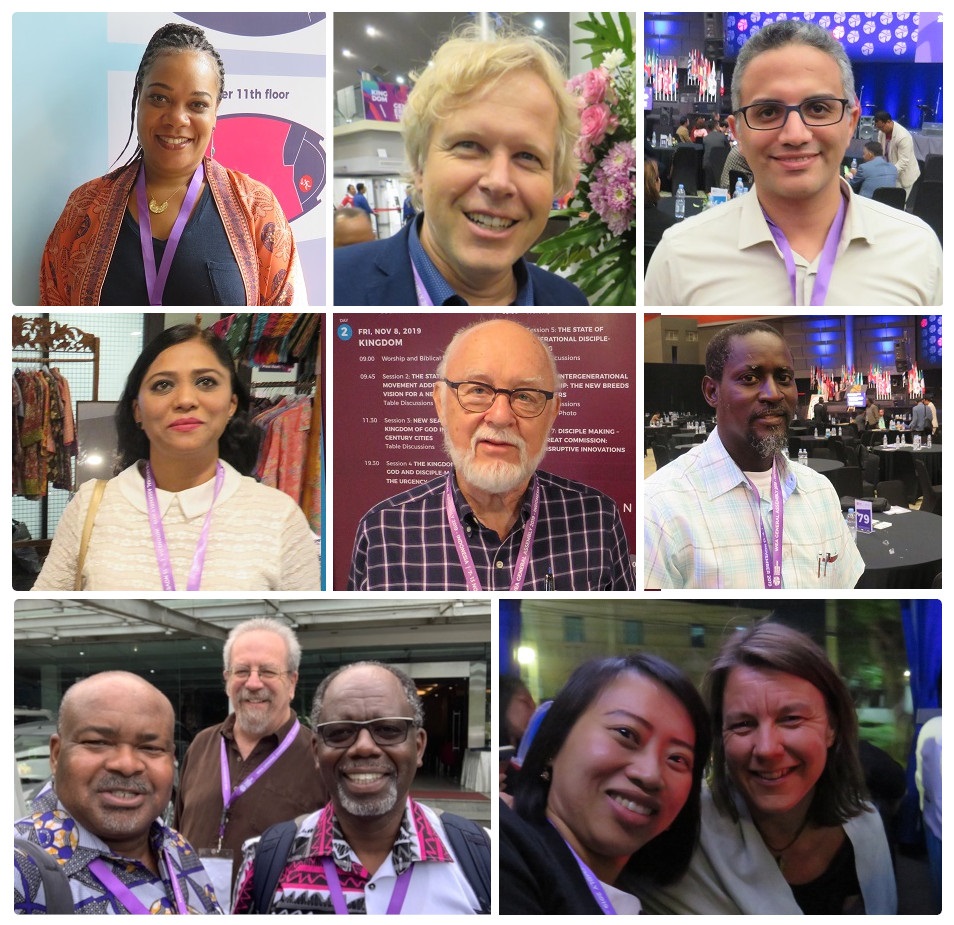
The highlight of any good conference is meeting people. Each one has a fascinating story. They are from (starting top left) the United States; Switzerland; Egypt; Pakistan; the Fraser Valley (Reg Reimer); Senegal-Ghana-U.S. / me / Kenya; and Thailand / South Africa.
The evangelicals are okay
Before heading off to Jakarta, I wrote Who is an Evangelical? (based largely on Thomas Kidd’s new book of the same name). Mostly the article considered the shade under which the movement exists in North America. In conclusion, I wrote: “I expect to see signs of the future configuration of evangelicalism at the General Assembly of the World Evangelical Alliance.”
The future of the movement looks pretty bright to me – and not one person referred to Donald Trump and the Religious Right, or any of the parochial travails on our continent. Not that the road is easy for believers in any nation, and all have their stories of failure as well as triumph.
In the next week or two I’ll look at the key role that Canada – and especially Brian Stiller – has played in sustaining the World Evangelical Alliance.
Detailed written reports of the WEA General Assembly can be found in a couple of places:
- Evangelical Focus: WEA GA: Intergenerational disciple making and mission in urban cultures
- Christian Today: Xia-Maria Mackay wrote several articles during the week-long event
- There are several stories on the WEA News page
